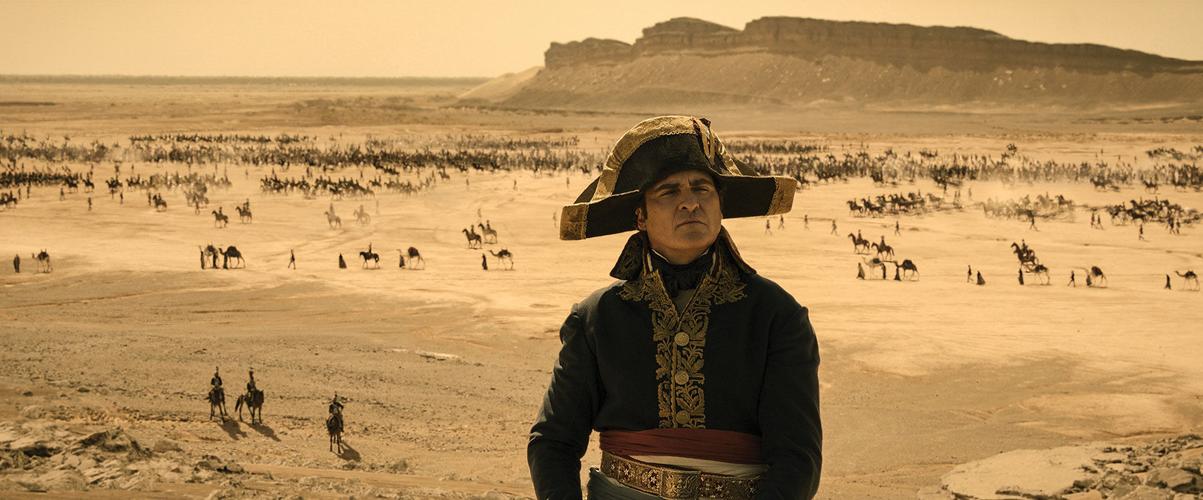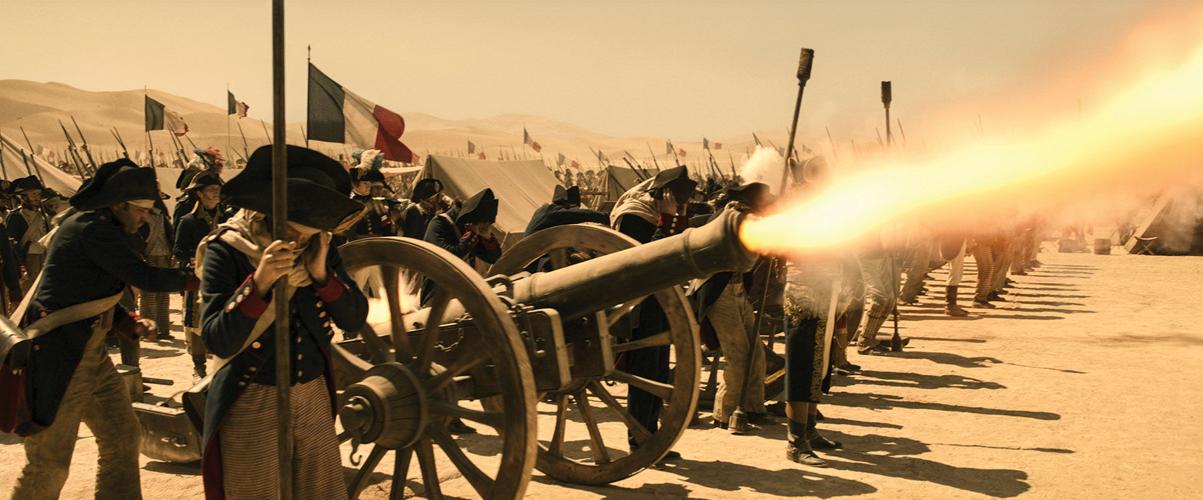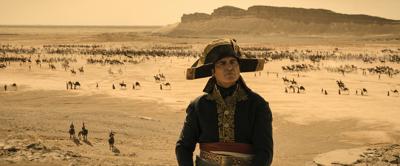As far as films about driven and kinky weirdos who reshaped vast swaths of the world, you can comfortably fit Ridley Scott’s Napoleon alongside Oliver Stone’s wrongly maligned Alexander and David Cronenberg’s Freud/Jung twofer A Dangerous Method. As far as the conventions of the modern biopic, you could call Napoleon accessible, and it presents its material in a straightforward fashion that should ease in the unfamiliar as well as keep historians laser-focused on the proceedings. But even still — and until we get the Wachowskis doing a Baron Von Steuben film or Alice Maio Mackay tackling the story of Joan of Arc — Napoleon is doing something different enough to demand a viewer’s attention.
As our titular Corsican, Joaquin Phoenix is interesting, with his equal parts Al Pacino-in-Scarface and Malcolm McDowell-in-Caligula hair, because he portrays Bonaparte subject to the enervating process of trying to balance a demanding job with a fulfilling relationship. For so long, his military triumphs come from an unflappable sense of destiny and insight — which is continuously tossed into chaos by his deep emotional insecurities. Every time he picks up a newspaper, it’s like he’s logged on to 18th-century social media, and the whole world is dunking on him. His love for Josephine (Vanessa Kirby, at points evoking Deborah Kara Unger in Crash with her moments of icy burn) is true, but also tied into all manner of kinks and quirks. Scott does a great job of deconstructing history — there are moments when without saying a word we get the slow, dawning realization of how much of the modern era is built on the foundations of sexual insecurity, and how the tiniest of choices and situations topple empires. (Real talk: Matrilineal succession makes sense.)
This is a film that understands the gory nature of life in the late-18th and early-19th centuries, and it serves up moments that gather some degree of momentum and strength as they proceed. But the proceedings are best served by Kirby’s Josephine, who owns the film fully, complicating and enlivening every scene she’s in, the film she’s in and, honestly, European history itself. Far too often when a film wants to ascribe agency to a woman, she is made a schemer, or a naïf who blunders into influence and power. But this Josephine is a pragmatist; observant and capable — she never falls into the tragic behaviors strong-willed women are often saddled with in historical narratives, and every time she’s on screen (or reading correspondence with Napoleon) the film jump-starts to a whole other level.

We’re thankful as viewers that Scott has a gift for depicting spectacle through different perspectives. It is to his credit — as well as that of his usual collaborators cinematographer Dariusz Wolski, production designer Arthur Max and costumer Janty Yates (this movie’s hat game is peerless) — that each of these rightfully legendary historical battles unfolds in distinctive fashion. As he does in period pieces (both past and future), Scott finds healthy tonal variety, adept in grandeur and leavening undercutting. The centerpiece of the film is Austerlitz, and it’s as exciting and visceral as any battle ever put on film, which is really saying something — there was a moment when the thought popped up that maybe Napoleon developed the Blazing Saddles Rock Ridge Decoy Defense, only to be immediately subsumed by the bone-chilling terror of ice shelves at their most precarious. It is a marvel of tension, shifting planes of action and gracefully artful depictions of deep horror. And that’s not even getting into how the unspoken objective of this film seems to be demonstrating exactly what cannonball-based warfare entails. You will not forget this particular lesson.
I’m not trying to play armchair psychologist, but the 2012 death of his brother Tony (also a treasure of modern cinema) lit a fire in Ridley Scott to put everything on screen, and he’s continuing to cover genres and styles with an energy and verve that directors 50 years younger than him can’t seem to muster. It may be consigned to be the dad-movie option this holiday season, but Napoleon is something interesting and strange, a portrait of a tremulous world painted in shades of horny anxiety.







